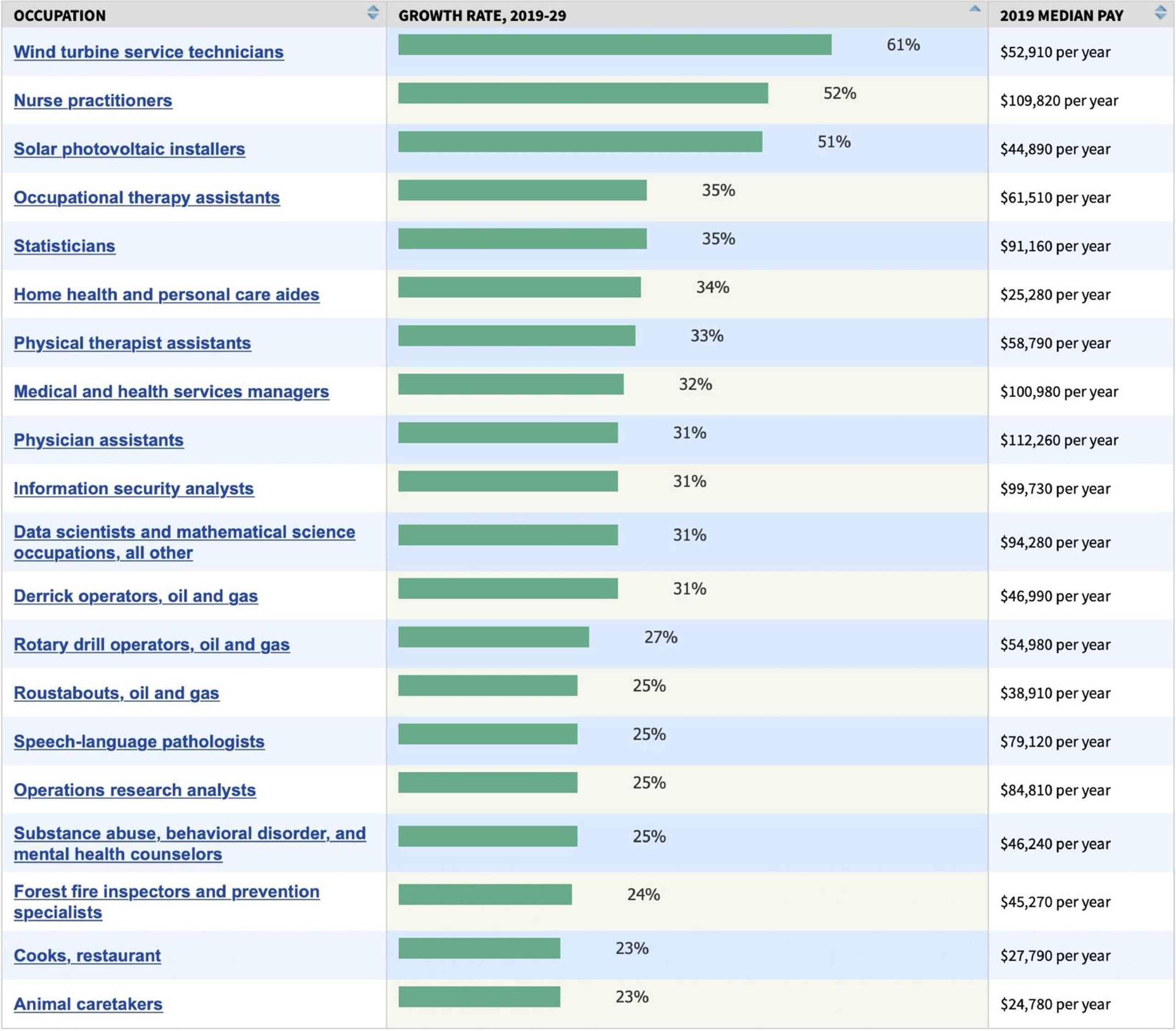Where the Jobs Are, and Where They'll Be
The pandemic has made some fields hotter, others colder and raised the risk of job loss due to automation
Add this to the list of the many ways COVID-19 is changing our lives: it's increasing job prospects in certain fields and lowering them for others. What's more, the pandemic has dramatically heightened prospects for job losses due to automation.

The upshot: if you're over 50 and looking for a job — or will be in coming years — you'll want to know about the latest findings and projections from the U.S. Department of Labor, LinkedIn's job experts and the McKinsey consulting firm. I've read them all, and spoken to LinkedIn's Andrew Seaman, to fill you in.
Jobs That Are Growing Now
Let's start with the urgent news for today's job seekers. Right now, 2 million Americans 55 and older are out of work (up from 1 million in February 2020), according to the AARP Employment Data Digest. And Bloomberg BusinessWeek says the U.S. economy has only added back 28,000 jobs for workers over 55 since August. Yet the new AAG Post-2020 Retirement Survey found that 46% of the people age 60 to 75 it talked to expect to work part-time or pick up a side job during retirement.
"Because so many people are out of work and there's so much intense interest in people changing careers or needing to figure out their next step, we decided to take a deeper look at the data on emerging jobs," said Seaman, senior editor for job search & careers at LinkedIn News. "The pandemic intensified the need [in the labor market] in some areas, or sped up the need in others."
The LinkedIn researchers analyzed in-demand jobs reflecting the pandemic's impact and came up with a list of 15 "jobs on the rise." You can read the entire findings in LinkedIn's article, "Jobs on the Rise," but here's what Seaman told me about five of them that may be especially suited to job seekers over 50.
TheLadders.com called life or business coaching "one of the top six fields job recruiters recommend considering if you're over 50."
Professionals on the frontlines of e-commerce. Businesses have ramped up hiring for e-commerce workers to serve Americans increasingly shopping online due to the pandemic. According to LinkedIn, hiring for these jobs grew 73% year-over-year and there are more than 400,000 open jobs in this field now.
"Some people can work from home, and the pay is typically better than what you would earn in a factory," Seaman said. Salary range: $42,000 to $56,000. "We've shifted pretty quickly and dramatically to an online world," Seaman noted.
Loan and mortgage experts. This reflects a combination of the huge home buying demand, low interest rates (average rate for a 30-year fixed-rate mortgage: 3.2%) and the rollout of the government's Paycheck Protection Program loans for small businesses. Hiring is up 59% from 2019, according to LinkedIn, and about a quarter of loan officer job postings mention remote work options. Median salary: $43,700 to $60,000, according to LinkedIn.
"This is a good area if you are good talking to people," said Seaman.
Health care supporting staff. No surprise that the pandemic has led to rising demand for people who support health care professionals — like pharmacy technicians, health coaches and intake specialists (people who direct patients to health services they need). Median salary: $65,300 to $106,000, notes LinkedIn. Health professionals have "so many people helping them behind the scenes," said Seaman.
Digital marketing professionals. These include social media managers, Search Engine Optimization specialists and even internet Influencers. Median salary: $48,000 to $96,000. Influencers, Seaman said, represent "an area where there's probably a little bit of a donut hole for older people with expertise."
Professional and personal coaches. The pandemic is leading many Americans to make career pivots or life changes, and coaches can help them do it. Hiring of coaches is up more than 51% since 2019, according to LinkedIn. Median salary: $44,300 to $50,000. (A recent article from TheLadders.com called life or business coaching "one of the top six fields job recruiters recommend considering if you're over 50.")
"This would actually probably be among the most perfect things for people who are older," said Seaman. "Either they have specialized training to help coach people to organize teams [in businesses] or they could be more of a consultant." Coaches "are almost like adult tutors," Seaman added, noting that "I know people who are making six-figure salaries as coaches."
Growing Fields for the Next 10 Years
Now to how the pandemic has changed long-term job forecasts.
Before COVID-19, the McKinsey consulting firm predicted that 7.9% of America workers might need to find new occupations by 2030. Now, it's one in 10, or 17 million people.
Last September, the U.S. Department of Labor released its employment projections from 2019 to 2029 (by 2029, all America's boomers will be at least 65 years old). Five of the 20 fastest growing industries for the next decade were expected to be in health care and the "social assistance" sector; the latter includes home health aides, child care workers, social workers and others. Among the fastest-growing health care occupations: physician assistants, nurse practitioners (52% job growth rate; the fastest of all occupations) and occupational therapy assistants.
But the researchers hadn't built the pandemic into their crystal balls. Recently, though, they've updated their forecasts to reflect the pandemic's potential impact on job growth between now and 2030.
"The COVID-19 pandemic has caused massive short-term disruptions to the U.S. economy and labor market, but its long-term impacts remain unclear."
To do that, the Labor Department offered two alternate scenarios: one where the pandemic will have a "moderate impact" on jobs (largely through more telework) and the other where it will have a "strong impact" with more widespread, permanent changes to consumer and business behavior to mitigate viral spread.
Why two scenarios? Because, as its Monthly Labor Review article about the updated projections said: "The COVID-19 pandemic has caused massive short-term disruptions to the U.S. economy and labor market, but its long-term impacts remain unclear."
In the moderate scenario, the Labor Department looks for increased demand for information technology (IT) and computer-related occupations, especially in IT security. Another field that will be hotter: scientific and medical research.
On the flipside, prospects look dimmer for office construction, due to less need for office space.
The strong-impact scenario looks to even greater job gains in IT support, as well as rising prospects for work in telehealth. IT jobs were forecasted to be among the 10 fastest-growing before the pandemic projections; now they'll be the fourth-fastest growing occupation, increasing by more than 40% through 2029.

But the Labor Department foresees further declines in jobs connected to restaurant dining, travel, hotels, live sporting events, theaters and concerts.
Employment in the pharmaceutical and medicine manufacturing industry is now expected to grow by about 19% in both scenarios, compared to the original 5.4% growth forecast. And the rise in telecommuting translates to a 19% increase in computer and peripheral equipment manufacturing jobs over the coming decade.
Also strong: jobs related to pandemic preparedness (now that we're more attuned to the possibility). The Labor Department expects heightened demand for biological technicians, medical scientists, biochemists, biophysicists and, of course, epidemiologists.
But retail jobs overall are forecasted to decline by 4% in the moderate-impact scenario (doubling the pre-pandemic forecast) and by 7% in the strong-impact scenario.
McKinsey's recent report similarly expects the greatest growth in labor demand by 2030 among health aides, technicians, wellness occupations and health professionals. It sees the largest declines in customer service jobs in retail and hospitality, food service, production work and office support roles.
What About the Robots?
But McKinsey also says the pandemic will lead to more job losses due to automation. Employers, it says, are increasingly looking for ways to operate with smaller workforces and at lower cost. The term describing this trend is "robotic process automation."
Before the pandemic, McKinsey said 37 million U.S. workers would lose their jobs to automation by 2030. Now, McKinsey has upped that gloomy forecast to 45 million.
The pandemic shakeup for jobs may mean you'll need to learn new skills, update ones you have or get training for a wholly different occupation.
More than two thirds of executives it surveyed in July 2020 (68%) said their business had accelerated the adoption of automation/artificial intelligence (AI) since the start of the COVID-19 outbreak.
The pandemic shakeup for jobs may mean you'll need to learn new skills, update ones you have or get training for a wholly different occupation.
Going Back to School to Get Hired
Unfortunately, America's colleges aren't doing a great job to help, by and large.
In her new book, "Long Life Learning," Michelle R. Weise writes: "Nobody really wants to go back to school, but more and more Americans are finding themselves in situations where they need to skill up or retool themselves to remain relevant in the labor markets."
But, she quotes National Skills Coalition CEO Andy Van Kleunen, "The way we've traditionally treated education in this country is the government is responsible for your education until age 18, and after that, it's more of a private matter."
One service that could help you find classes to make you more employable is a free website with the unlikely name of Classfinder With Frank. It lets you find discounted college courses online for credit toward a degree.
With today's cost of college and the growing need to reskill, something like Frank could be a useful pandemic tonic.


